Subsistence aquaculture in the highlands of Guinea to support women’s activities and enrich rural community’s livelihoods
2020.08.14
In the highlands of the Republic of Guinea, West Africa, “community-based aquaculture” of river fish is playing an active role in the empowerment of women. In this region, there exists a traditional activity of harvesting fish from marshes that are created by seasonal flooding of the Niger River. JICA has been working to assist the promotion of a new type of aquaculture which transforms natural marshes into aquaculture ponds and fertilizes them to improve productivity of fish. This method of fish farming is practiced mainly by women and is expected to contribute to aquaculture development in the country.
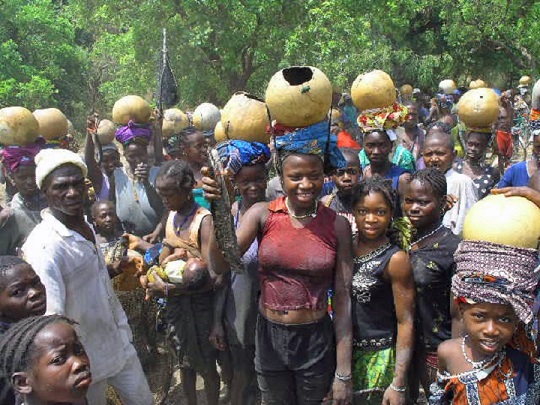
The harvest was carried out in community ponds, which were created with the technical assistance of JICA. Here, women play the lead role. Gourd baskets are placed on their heads to hold the fish (Niankamba Village, Dabola Prefecture, April 2005)
“The harvest festival is a community’s tradition. It is fun because, once a year, everyone in the village comes out to work together!” says Mrs. Bangoura, who lives in Djomabana Village, Siguiri Prefecture in the highlands of Guinea, talking about the harvest festival in the community fish ponds. In the interior region of West Africa, women traditionally play a central role in catching fish, such as catfish and tilapia that are popular food items in their daily diet. One of the advantages of this fish harvesting practice is that it does not require special fishing skills, and it can be conducted in the vicinity of the village. As such, women are able to catch fish without sacrificing time for other household duties.
However, the volume of fish harvested by this traditional method was always fluctuating and limited, and hence it was called a ”blessing from God.” Since the 1990s, due to the reduced rainfalls in the region, the size and number of natural marshes have decreased in the highlands of Guinea, and the fish harvest has also declined. From 2005 to 2009, an expert dispatched by JICA tackled this problem and promoted a new aquaculture method, whereby marshes are excavated to retain more water, and agricultural by-products such as threshing shells (rice husks) and dry cow manure are used to fertilize it. In the process, due care has been taken not to change the traditional practice of fish harvesting drastically. Approximately 40 marshes that dry up entirely in the dry season were selected and converted into community-owned ponds to encourage fish growth. As a result, the fish yield has been more than doubled.
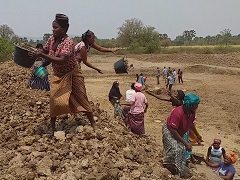
During the dry season from March to May, the bottom of the marshes are deepened like a swimming pool to excavate community-based ponds for fish farming
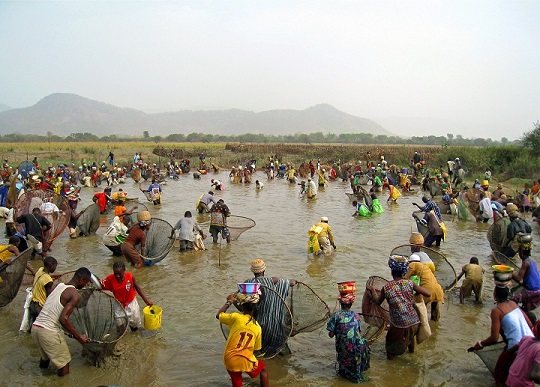
The harvest festival of Morigbeya Village, Dabola Prefecture. The increased production of fish brought by the community-based aquaculture has revitalized the festival (April 2007)
JICA was forced to suspend assistance for 10 years between 2009 and 2018 due to a coup d’état and an Ebola outbreak, but it finally resumed in March 2019. When the experts once again visited Guinea, they found village women continuing with community-based aquaculture on their own.
“In order to secure food for their family members, the women did not wait for the external support that was interrupted, but, instead, proactively excavated marshes. In addition to the annual harvest festival in which all villagers participated, they organized a series of women-only harvest events in an effort to increase the production volume,” says Expert MURAI Tadashi, who has been participating since the initial project in 2005.
Community-based aquaculture also has a significant impact on the revitalization of villagers’ collective work. “The revival of the harvest festival in the marshes allowed us to reaffirm the village's identity and unity. People who are residing outside of the village for work also return to their home to participate in the event. This, thereby, strengthens the bonds among villagers. Food security and traditional culture are the central elements of rural life,” says farmer Mr. Diallo (representative of the pond administrators) of Dogolen Village, Mandiana Prefecture.
In Guinea, due to the decrease in rainfall caused by the probable effects of global warming, as well as the increased sediment due to deforestation at higher altitudes, not only marshes but also forests are diminishing. Preserving marshes through community-based aquaculture contribute to the protection of the local environment, livestock breeding and improved agricultural productivity since marshes are a critical source of water for them.
The awareness of the villagers has also improved thanks to the community-based aquaculture. It has led to changes in people's attitudes as well; they try to cope with the natural environmental changes by setting their own water-management objectives and acting proactively to achieve them.
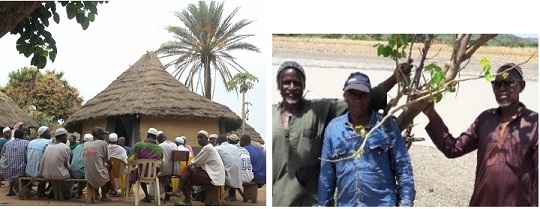
(left)Awareness-raising activities for villagers. Community-based aquaculture is also leading to the revitalization of villages and changes in people’s awareness
(right)”Fish prefer to be beneath trees, so we are planning to work on tree-planting as well,” says a member of the pond management committee of Dogolen Village, Mandiana Prefecture
As of January 2020, community-based aquaculture has expanded to 83 community-managed marshes in the highlands of Guinea. Apart from the extension of the community-based aquaculture, the government of Guinea created a specialized agency for aquaculture development to promote privately owned aquaculture ponds for commercial sales of farmed fish in the country.
“We expect that community-based aquaculture will be implemented in more than 500 marshes in the highland area alone. There are a total of 700 marshes that can be transformed into aquaculture ponds throughout the country. We will continue working with the communities to realize year round harvest,” says Expert Mr. Murai looking forward to the future.
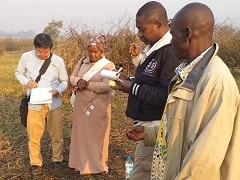
Site evaluation activities in Somaya Village, Dabola Prefecture, in the highlands of Guinea. Expert Mr. Murai (left) discusses with residents and government officials
scroll